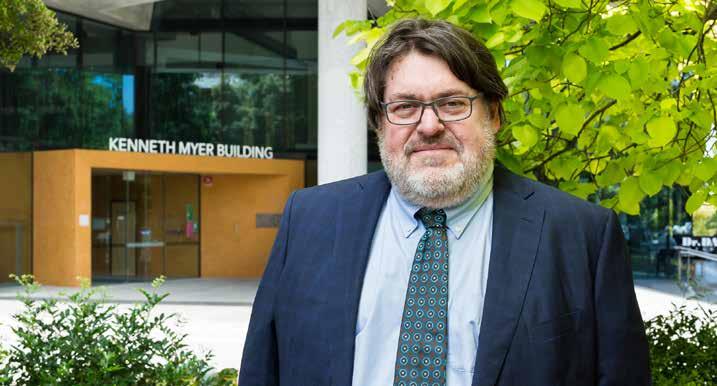
1 minute read
Director’s Report
In 2020, the COVID-19 pandemic forced us to collectively set aside our existing plans and adapt to this public health crisis. Despite these challenges, I am very proud to inform you that the Florey not only navigated the situation but our staff and students pulled together and excelled.
In this year’s annual report, you’ll read about how we found new and innovative ways of working together to continue our important research. The report features highlights from the critical work the Florey performs across more than 18 diseases and disorders including dementia, stroke, epilepsy and mental health, as well as discovery science which provides us with an understanding of the brain and its mechanisms. You’ll also read about how our scientists turned their expertise to the COVID-19 threat and how their work provided two worldleading projects and made media headlines.
Our successes in this challenging year were achieved because of the extraordinary dedication of our staff and students. I would like to take this opportunity to thank our operational and support service teams who, despite some of the strictest restrictions on movement in the world, continued to maintain the infrastructure and services which enable our scientific discoveries.
I would also like to acknowledge and thank our researchers and students who remained focused on the importance of the work that we do and persisted in their goals to understand, prevent and cure diseases of the brain. My sincere thanks also go to the Florey’s board members who provided exceptional guidance and support throughout the year.
When I reflect on 2020 in years to come, I suspect that an enduring memory for me will be the many webinars that we provided to maintain the connections and motivation of our staff and students. Throughout these discussions, we continually returned to the theme of the generous support and encouragement that we receive from our donors, our partners and the Federal and State Governments. On behalf of all at the Florey, please accept our gratitude for being part of our advances in brain and mind science.
Professor Steven Petrou PhD FAHMS Director, Florey Institute of Neuroscience and Mental Health
Our cover photo globe-asia florey.edu.au facebook-square facebook.com/TheFlorey twitter-square twitter.com/TheFlorey instagram-square instagram.com/TheFlorey youtube-square The Florey Institute of Neuroscience and Mental Health linkedin The Florey Institute of Neuroscience and Mental Health
Stem cells present a novel way forward for repairing the injured brain. Our researchers are advancing stem cell-based therapies for neurodegenerative conditions like Parkinson’s by investigating how stem cell-derived dopamine neurons can functionally replace lost dopamine when transplanted into the brain.
The cover shows a brain graft containing dopamine neurons (green) grown from human pluripotent stem cells. Different types of dopamine neurons embedded in the graft and growing into the surrounding area are represented (red and blue). Image credit: Neurogenesis & Neural Transplantation lab and Stem Cells & Neural Developmental lab.




